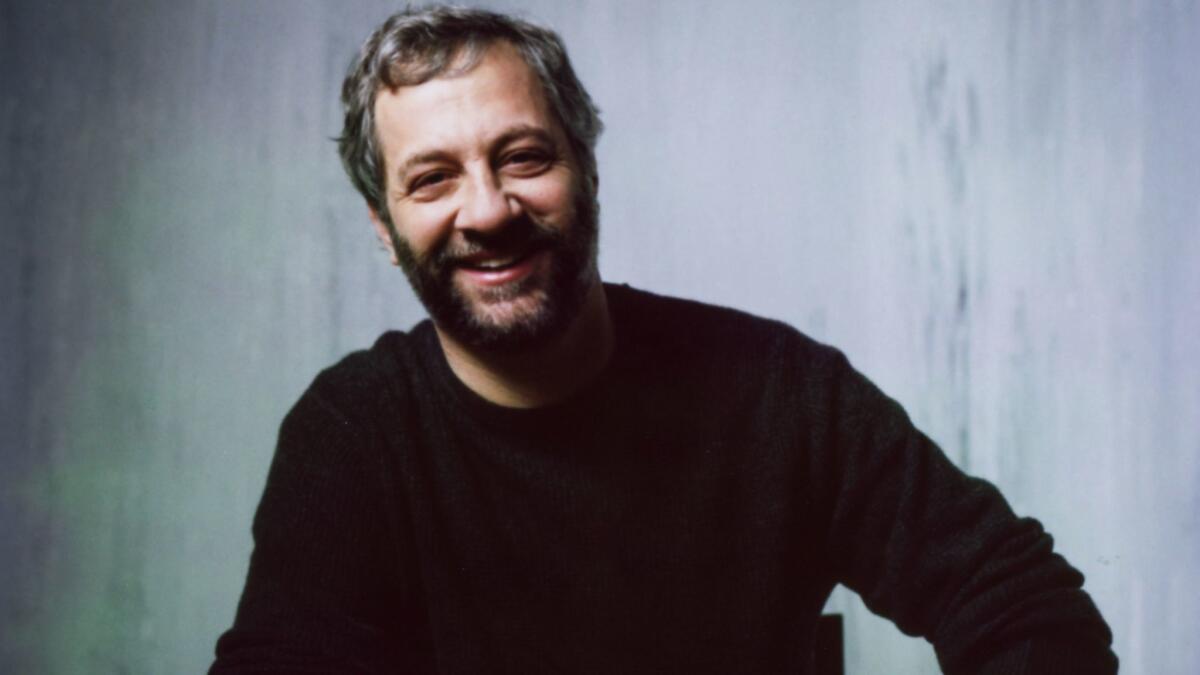Q&A: Judd Apatow on Harvey Weinstein, sexual harassment and how to stop abusive men in power

“I found it shocking how few people in show business spoke out against Cosby,” Apatow says. “And to this day, there’s an enormous part of our industry that still hasn’t. And that does not speak well of our community.”
“Because when people don’t speak out at a moment like this where it’s really not a question of whether or not it happened,” Apatow adds, “it creates a world where people feel like stepping forward won’t do anything but re-injure them.”
In the wake of the multiple allegations of sexual assault and harassment against producer
How pervasive is sexual harassment and abuse in the entertainment industry?
When you work on a movie or television show, the people who run the show set the tone. If the executive producer or director is a respectful person who cares about the crew and the actors and actresses being treated well, for the most part, that’s what happens. And if there’s a problem, people will feel like they’re in an environment where they’re allowed to speak up. There are toxic sets and there are toxic people. When that happens, for the most part, they’re very clever about how they do it. They learn over many decades how to not to get caught.
How do they manage this?
These people prey on young women who are looking to begin their careers, and they do that on purpose. When you’re young and you don’t have a lot of money, it’s very easy to scare somebody with the threat of all the doors closing on your career and, potentially, lawsuits that you can’t afford to defend yourself from. That’s why Cosby didn’t get caught for so long. It’s why priests don’t get caught. It’s why
When you don’t have a career and you’re victimized like this, it’s traumatizing. It’s one of the cruelest things you can do to somebody, to abuse that kind of power. And I’m hopeful that people’s awareness of this is rising and that creates an environment that more people will come forward when they are victimized.
You say you’re hopeful. Why has it taken so long for this awareness to come about?
It’s sad to say, but there aren’t that many heroes in this world. People do not want to put their livelihoods at risk. That’s why people like Harvey Weinstein and Bill Cosby get to operate like this for so many decades. The people around them — executives, assistants, drivers — they don’t want to risk everything to confront a very dangerous man.
Early in my career, I was threatened by an executive, not in a sexual manner, but in a business manner. And he got his way and I was scared to death. I had somebody say, “If you do this, it’s going to be really bad for your career. It’s not something you want to do at the start of your career.”
I also think that people don’t want to be defined as victims of this particular harassment or crime. As soon as you speak up, in some sense, you fear that that is what people will define you as — the person who complains. You see how all of Cosby’s victims are treated. Instantly, people are questioning whether they are gold diggers. And whether or not they’re lying. A lot of people don’t want to put themselves through that. It’s life-altering.
I went to the Rape Treatment Center’s foundation event last year, and a lot of Bill Cosby’s victims were there and you could tell it has affected them their entire lives. It wasn’t just the moment. They were seriously injured in ways that affect them to this day.
You’d think by the time you get to settlement five, six and seven, you’d take some sort of action to protect other women from this crime.
— Judd Apatow
You certainly felt that injury deeply reading the accounts of these women in the Weinstein investigations.
It destroys your faith in your community. What is most disturbing to me is the people around him that allowed it to happen. It’s very easy to talk about actors and actresses and say, “Didn’t you know?” But you hear “somebody’s a pig.” You don’t know what that means. And then what are you going to do about it? Unless you hear it directly from somebody who was harassed, there’s not a lot you can do.
But if you work for somebody and there’s talk in the office and somebody says to you, “Hey, we’re going to do a meeting with an actress. And at this time, we’re all going to leave so Harvey’s left alone with her,” then you are complicit in these crimes. And over 30 years, there’s probably a long list of people who knew exactly what was going on. It wasn’t just rumors at a party. They were the people writing the checks — business managers and agents and lawyers who knew exactly what was happening.
The assistant telling Cara Delevingne to go to Weinstein’s room because her car hadn’t arrived.
All those people knew. And that’s terrifying. Think about the people writing the checks. Harvey had eight settlements. There are people involved in those settlements. And you’d think by the time you get to settlement five, six and seven, you’d take some sort of action to protect other women from this crime.
It goes back to the cleverness in perpetrating these crimes. They learn over many decades how to not get caught. This is why a lot of these people are very charitable. They hide behind good deeds in the way a priest does. So people are even more reticent about speaking up because they just gave millions of dollars to this or that charity.
Harvey Weinstein gave $5 million to USC to promote female filmmakers. And obviously that’s a very important charity. But you have to wonder: Is he making that donation out of guilt or as a distraction so you can’t accuse him because he’s known as the guy who cares about female filmmakers? It’s like Cosby giving all the money to colleges. These people refine their crime over many years and it takes very strong courageous people to take the risk of standing up to say, “Stop it.”
“Girls” tackled a lot of these issues in an episode last season, “American Bitch.” Had Lena Dunham talked to you about sexual harassment?
She had told us for many years that one of the most troubling things that was happening was people she respected would meet with her and talk as if they were two artists discussing their trade. And then at some point they would get incredibly inappropriate. It was a real abuse of power that troubled her enough to write about it.
There’s a lot of abuse in this town that isn’t as overt as what Harvey Weinstein does. Young actresses are mistreated in all sorts of ways by powerful men who can dangle jobs or access to exciting parts of show business. I think a lot of people are mistreated and they don’t realize how badly they’re being mistreated.
TV reporter Lauren Sivan detailed that abrupt shift into the inappropriate with Weinstein. She said one moment they’re talking as equals, the next he’s exposing himself and masturbating.
And why do you want to be known as the person who’s a part of that in any way? There’s a lot of shame that happens even when it is not your responsibility at all. A lot of people have written very eloquently about it in the last few days. I like it when everybody stands up.
Only good movies
Get the Indie Focus newsletter, Mark Olsen's weekly guide to the world of cinema.
You may occasionally receive promotional content from the Los Angeles Times.




